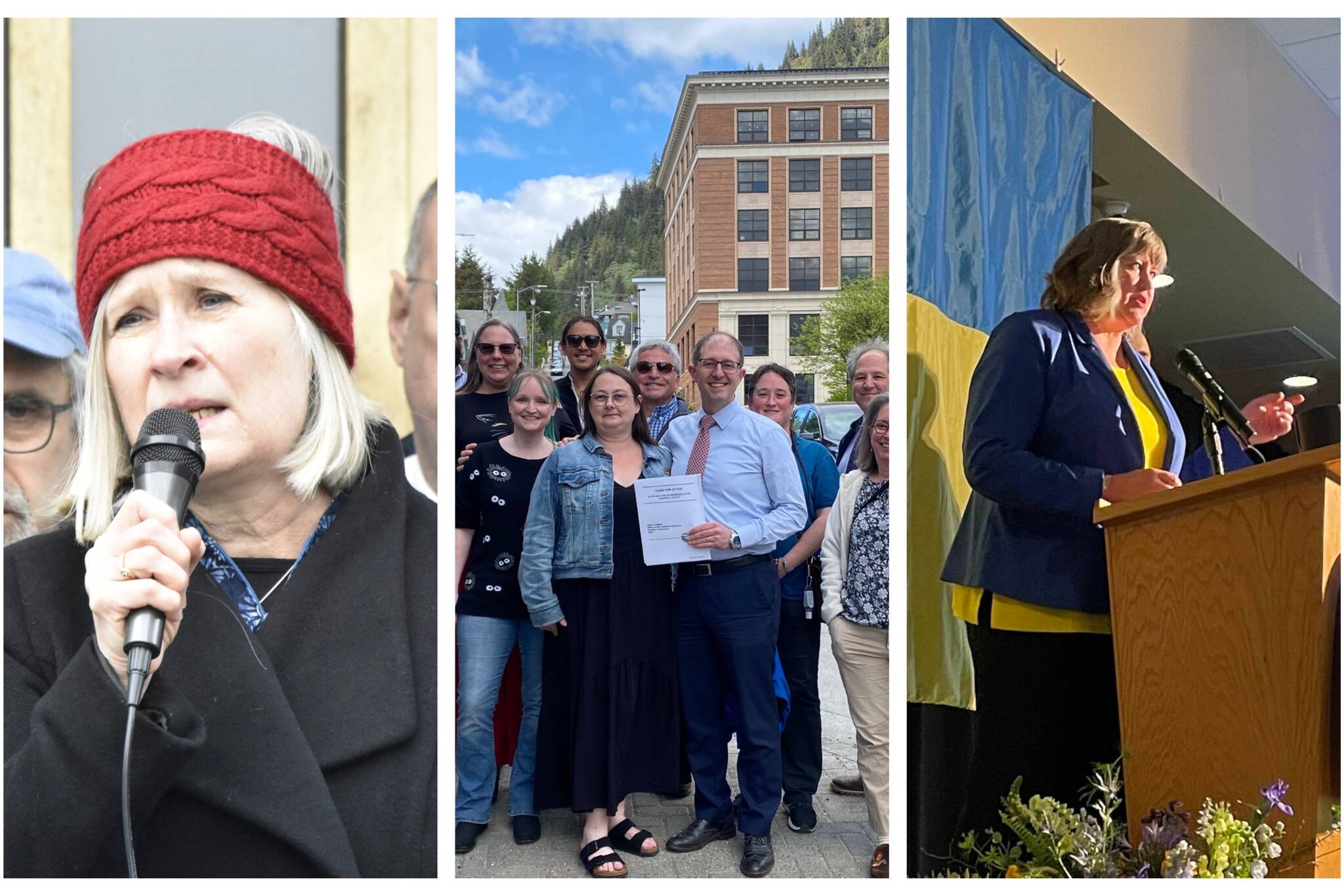All three of Juneau’s lawmakers in the Alaska State Legislature have filed for reelection, and as of Friday afternoon, all three, Sen. Jesse Kiehl and Reps. Sara Hannan and Andi Story, all Democrats, were running unopposed.
“I’d be really surprised if that continued,” said Rep. Andi Story, D-Juneau. “They sign up really early or they sign up on June 1.”
The deadline to file for office is June 1, but this year the state’s legislative districts have been the subject of a protracted legal dispute between the Alaska Redistricting Board and several litigants. However, on May 24, the Redistricting Board adopted a court-ordered interim plan for districts.
Most of the dispute centers around Anchorage, but early in the process, the City of Skagway sued the board for its decision to put Northern Lynn Canal communities in the same district as the Mendenhall Valley in Juneau. But the courts upheld that decision, and now Story’s district includes the Mendenhall Valley as well as Skagway, Haines, Gustavus, Hoonah and Klukwan.
“Obviously I have more people to meet that I haven’t yet and listen to their concerns,” Story said. “But representing Southeast Alaska, Juneau, we are very much attuned to the issues in Southeast.”
[After 33 years in Juneau, Coast Guard cutter gets a new home]
Hannan’s district changed too. Previously, Hannan’s District 33 covered Douglas Island, downtown Juneau and the Northern Lynn Canal communities. But now Hannan is in District 4 which covers Douglas, downtown and parts of the Mendenhall Valley. Story’s District 3, covers the Mendenhall Valley, the Juneau neighborhoods north of the ferry terminal and the Northern Lynn Canal.
Hannan said her district was changing, but it was through representing smaller communities like Gustavus that she learned about issues like PFAS chemicals — so-called “forever chemicals” that have been shown to be extremely toxic — which have caused contamination in Juneau and throughout the state.
Juneau’s delegation worked well together, Kiehl said, and if all three are reelected, that relationship will continue.
“We have always worked as a team,” Kiehl said.
Juneau’s Senate District Q is now District B, and aside from a small strip of unpopulated land, Kiehl said all his constituents are the same.
All three of Juneau’s lawmakers began their terms in 2019, at the same time Gov. Mike Dunleavy’s administration was making significant cuts to the state budget, following a collapse in the price of oil in 2015. That was before the COVID-19 pandemic, which shut the Legislature down early in 2020 and introduced a whole host of other issues for lawmakers to deal with.
“There’s been some rollercoasters since I got in,” Hannan said. “There’s still a lot of work to do on the original issues that I ran on which is a stable fiscal plan.”
Lawmakers have yet to settle on a new formula for the Permanent Fund dividend, though many lawmakers have expressed support for the so-called “50-50” PFD, which would take half of the state’s annual draw from the earnings of the Alaska Permanent Fund and put it toward dividends with the other half to state services.
But a bill enshrining a new formula wasn’t able to pass out of the Legislature this session, and several lawmakers have noted that without enshrining the payments in the state constitution, future lawmakers can simply ignore any funding formula for the dividend.
“We have to fix the PFD issue and get our state on a more stable financial footing,” Kiehl said. “The annual ad hoc (PFD amount), the annual fight, it’s tying us in knots and it’s preventing a lot of progress.”
Both Hannan and Story — both former teachers — talked about making sure Alaska’s schools were funded. In the last session, the House passed a bill sponsored by Story to increase the Base Student Allocation — the amount of money districts receive per student — but in the final budget bill the BSA was only increased by about $30.
The act of moving bills and hearing them before committees helps educate other lawmakers, Hannan said, but with the election changing the composition of the Legislature, it was hard to say how close the state is to finding agreement.
“Moving bills helps educate people,” Hannan said. “As you know we’re going to have a substantial change from who’s in.”
Around the state
Several lawmakers in both the Alaska House of Representatives and the Senate have announced they will not seek reelection. Senate President Peter Micciche, R-Soldotna and Sen. Lora Reinbold, R-Eagle River, announced they will not seek reelection and Reps. Adam Wool, D-Fairbanks, Ivy Spohnholz, D-Anchorage, and Tiffany Zulkosky, D-Bethel, have said they won’t run again.
The recent redistricting decision has changed the composition of districts in Anchorage, the state’s most populous area, and the state’s new ranked choice voting system will be used for the first time this year.
People voted for ranked choice voting because they wanted to see a change, Story said, and she was hopeful the system would lend itself more to focusing on issues rather than political party.
Hannan said she was not an advocate for the system, but that the Divisions of Elections is doing a good job of educating the public.
“It’ll be fascinating,” Kiehl said. “I think we have a huge education job in front of us to make sure every voter understands how this works.”
• Contact reporter Peter Segall at psegall@juneauempire.com. Follow him on Twitter at @SegallJnuEmpire.

